Always on Guard

The best indication that the bodyguards for Israel’s Yom Tov guests are doing their job is that you can’t even tell they’re around
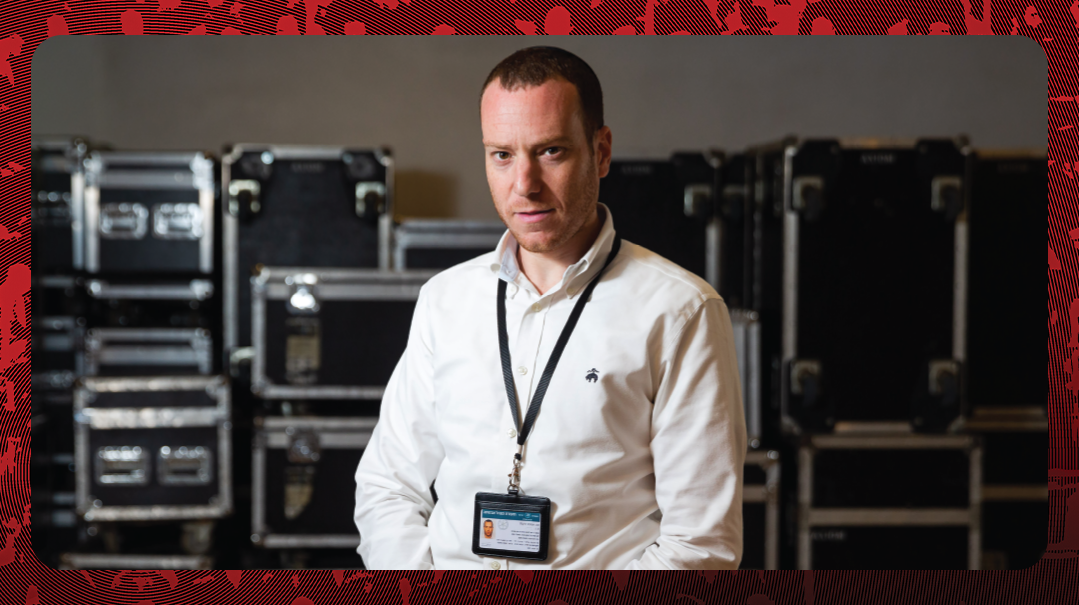
Photos Elchanan Kotler, Daniel Nefoussi
While Avigdor Dreksler’s “Avigdor 226” Israeli security company deals primarily with crowd control for large events in the chareidi sector, the Jewish holiday season is especially hectic for him — and not only because of Chol Hamoed concerts. Drexler is the address for the dozens — perhaps hundreds — of wealthy Jews of influence who won’t travel to the Holy Land for Yom Tov unless they have a bodyguard.
Of course, he doesn’t mention names — that would be the first breach in a profession requiring tight-lipped discretion — but you can probably guess who at least some of those gvirim might be.
Many VIPS around the world consider a bodyguard, or what’s known as “executive protection,” something of a status symbol while on vacation, although others hire personal security because of real fears of kidnapping or terrorism. While some visitors to Israel are nervous about lone-wolf terror shootings or stabbings, many of Dreksler’s clients need another kind of protection: As famous (and easily recognized) givers renowned for their generosity, they need a balance between tzedakah opportunities and family time, while passionate, driven collectors can be quite creative when it comes to finding out where wealthy visitors are staying.
“Of course, they also want to feel safe going to kivrei tzaddikim, Chevron, Har Hazeisim, Kever Rachel, and other places that might seem risky,” says Dreksler, whose company is also in charge of security at Jerusalem’s Binyanei Ha’umah convention center.
“The first thing I check is what the primary need is. If it’s making sure a philanthropist gets private time outside of his tzedakah hours, then sometimes I’ll arrange for a burly crowd-controller. But some of these people have bodyguards year-round because of fear of theft or even kidnapping. And there are those who need a bodyguard because their insurance forces them to.
“And if the client specifically requests an armed bodyguard, we can provide one as well — generally a graduate of a commando unit who’s gone through culture and sensitivity training to fit into the chareidi world.”
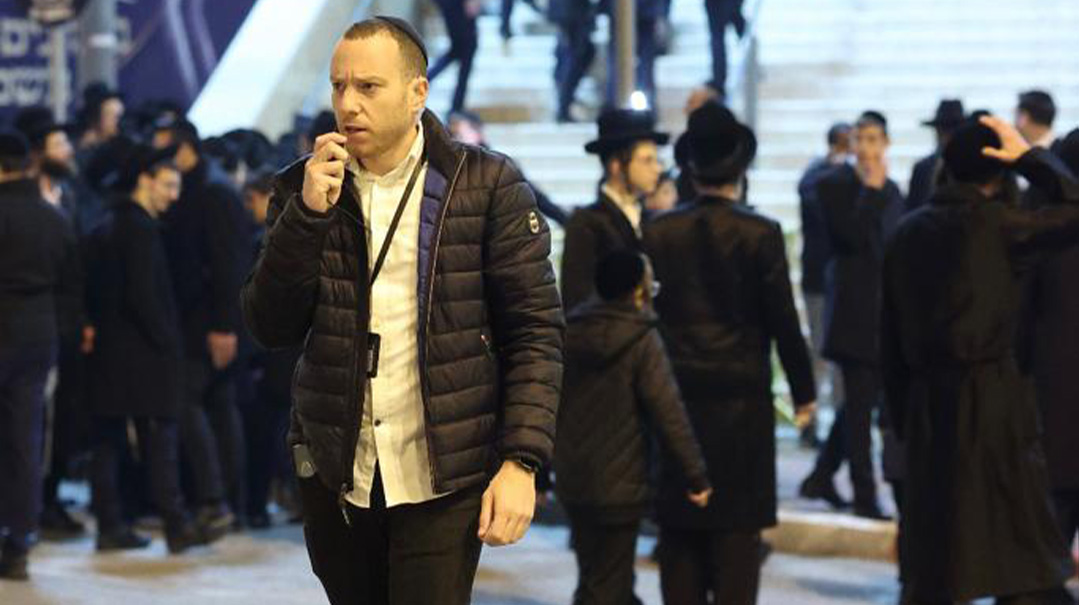
What You Don’t See
Whatever the reason for hiring a bodyguard, the best proof that “Avigdor 226” provides top security personnel for the country’s Yom Tov guests is that most people don’t even notice them.
When we think of a security detail, we tend to conjure up the image of a suave, sophisticated security operative with reflector sunglasses and an earpiece. But, says Dreksler, when you see Prime Minister Bibi taking his daily jog followed by the fellows with the sunglasses and transmitters running behind him, you don’t realize that most of his real security is actually that which you don’t see — anonymous cars and people in the shadows, with hidden mics and body cameras. He notes that the State of Israel is the most advanced country in the world when it comes to security apparatuses that are essentially invisible.
Even if bodyguards are spotted with their clients, for the most part they’re not living it up on the edge of glitz and glamor. Executive protection professionals are not there to rub elbows with the rich and famous; they’re trained to keep a professional distance while monitoring the surroundings, always on the lookout for any potential threat.
Nachman Revivo, who occasionally takes jobs from Dreksler and who’s been in the personal protection field for about 15 years, has mastered the skill of disappearing into the background.
“I’ve worked in private protection for many gvirim, and most of them don’t want anyone to know about it, so you have to blend in,” says Revivo, who served in a search and rescue squad in the IDF and is licensed for personal security. “If they go to a wedding, then you get dressed for the wedding too, you also hand over an envelope, you sit next to him and act like one of the guests.”
After the shocking murder in 2011 of Rav Elazar Abuchatzeira by a mentally unstable disciple, many well-known rabbanim and rebbes ramped up their own shemirah, mostly with a cadre of bodyguards affiliated with the chareidi sector. Nachman, a follower of Rav Gamliel Rabinovitch, was on the security detail for Rav Chaim Kanievsky the following Purim.
“That was basically crowd control, so there wouldn’t be a crush,” he says. “I can’t imagine anyone out to get Rav Chaim, but nevertheless our job was to be vigilant.”
While Dreksler always carries a gun and some of his hired agents — like Revivo — are often armed, not all bodyguards are, and many don’t even have gun licenses. Some work in environments where guns would be out of place — think “protecting” visiting rebbes or rabbanim such as Rav Chaim from overenthusiastic crowds.
But armed or not, says Dreksler, they all share a common goal: They’d rather not resort to force. Instead, they’re focused on preventing circumstances where force becomes necessary. Despite what’s shown in the movies or on TV, the trigger-happy, sharpshooting bodyguard is far from reality. Fighting or drawing a weapon can sometimes be necessary, but it’s always viewed as a last resort.
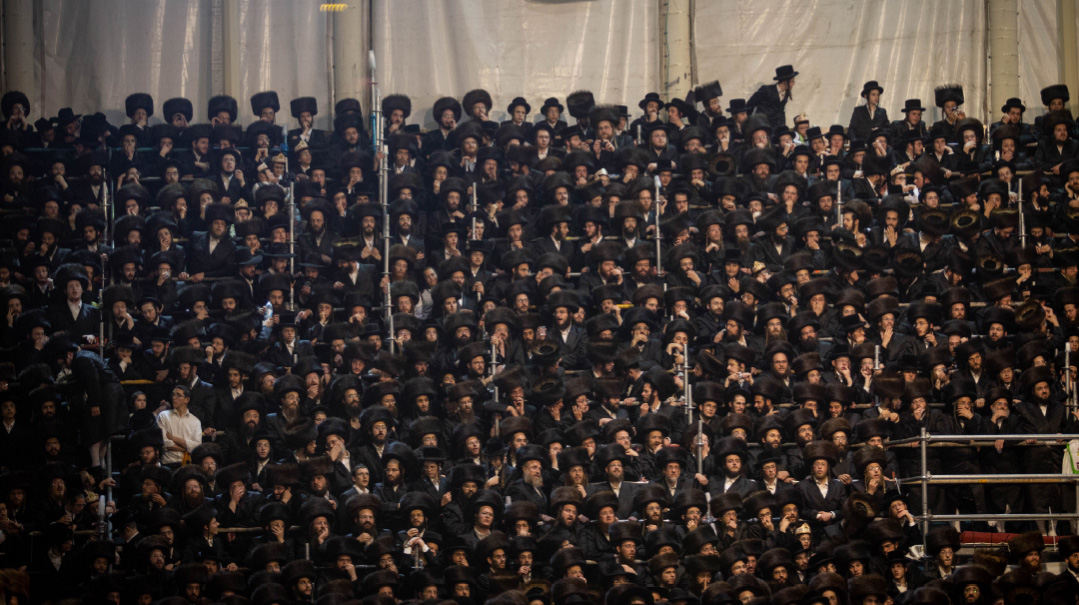
Doing My Part
How did yeshivah bochur Avigdor Dreksler become head of the country’s only boutique security company for the chareidi public?
Dreksler, who’s 34 today, was an avreich in Yeshivas Rashi’s kollel during the precarious period of terrorist stabbings in 2014-2015, when anyone walking on the street turned into a target.
“I was trying to figure out my cheilek in all this,” he remembers. “How could I help? I was already 26, married with two kids, and starting army service at that point wasn’t practical or realistic.”
Just then, Magen David Adom began a program for security training. Avigdor signed up, did the course, and then went on to complete an accredited program in security and administration.
“There’s a certain disconnect between security and the chareidi sector,” he says. “I was the first and only chareidi participant in the course.”
He became head of security at the Ir David archaeological and tourist site, where he supervised a team of security personnel to guard against theft and vandalism and ensure tourist safety. Then he was appointed head of security in his neighborhood of French Hill, which abuts several Arab enclaves within the Jerusalem municipality.
Soon enough he established name familiarity and began getting commissions to secure chareidi events — including organizing security for Rav Chaim Kanievsky in his later years, when he attended mass gatherings.
“Rav Chaim, of course, didn’t need armed security,” Dreksler notes, “but he did need bodyguards to prevent crowd crushes by an enthusiastic public that sought him out. Whenever he would travel, we had to assess how to get him out of the car without being trampled while preserving his kavod and dignity. Sometimes the crowd would wait for him by our decoy door, and instead we’d sneak him through another door.”
Did he know that there was a security detail around him? “Look, he knew that if he needed to get from one place to another, it would entail crowd control. And although I was pretty busy at those events, I always made sure to get close to him for a minute and request a brachah, so he probably realized my role.”
Dreksler took his place in the industry several years after Rebbetzin Batsheva Kanievsky passed away; and although there was no security detail for the hundreds of women who would converge on her home daily or meet her in the Lederman Shul early in the morning, he says there were always a few girls around her who discreetly maintained crowd control.
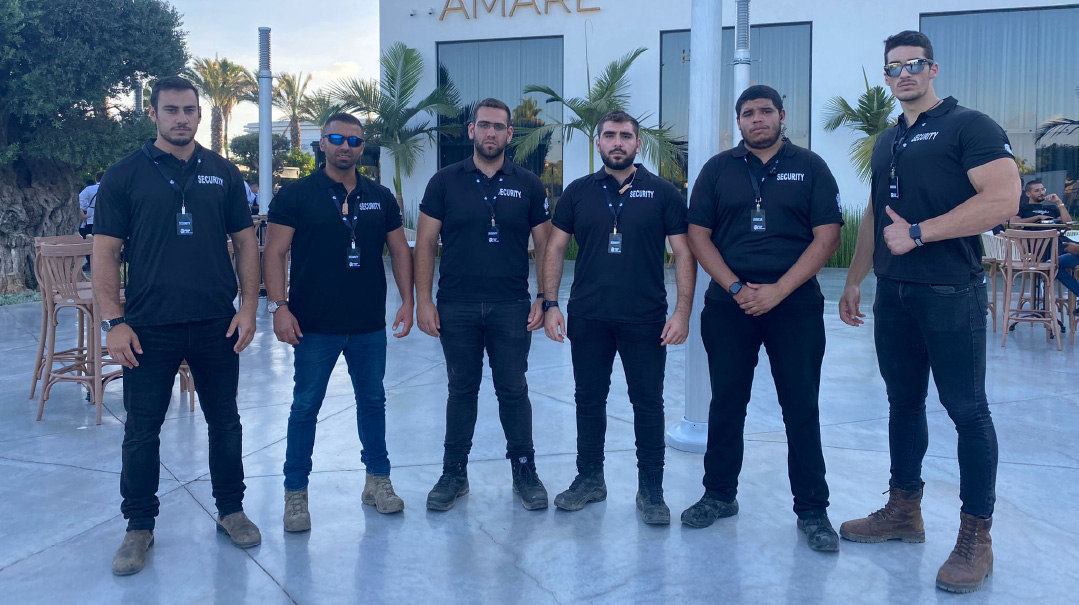
The gym is the best recruiting center. “Anyone I see working out who’s big and intimidating, I just walk up to him and ask if he’s interested in doing private security jobs and I take this number”
Red Flags
Today, not only is Dreksler in charge of security at Binyanei Ha’umah, he’s also the advisor to the police — and sometimes even the Shin Bet — regarding religious events in venues all around the country.
“They tell me, ‘such and such rabbi is coming,’ but they don’t really know who he is or what kind of a crowd he’ll draw,” Dreksler says. “When Rav Meilech Biderman presided over a hadlakah in Beit Shemesh last Lag B’Omer, they had no idea how big a crowd to prepare for, because they didn’t even know who he was or what a draw he was. I told them to prepare for thousands of people, even though they’d never heard of him. There were at least 10,000 people there, and while the police were shocked, they were also prepared.”
The police also consulted Dreksler when planning the logistics and security arrangements for a Naftali Kempeh concert in Kiryat Sefer. The police, who were not familiar with him, looked at some of his videos online and weren’t impressed with the low-key performances — just a yeshivah guy with a guitar, no flashing lights, pounding rhythms, or slick production. No way, they thought, this guy won’t bring out too many people.
“I told them in Kiryat Sefer, 10,000 people will come out for him,” Dreksler says. “And that’s what happened. Had the police done it on their own, the concert would have been an unorganized mess with a lot of frustration for everyone.”
For the past few years, Dreksler has secured the annual Yom Yerushalayim Hallel event with Shlomo Katz, held on the Haas Promenade at Armon Hanetziv, overlooking the Old City. It would be a basic crowd-management assignment, except for the fact that the neighborhood borders a sometimes-volatile Arab village.
“These events are not generally targets of organized terror,” he explains, “but they are targets for lone-wolf attacks, a guy who gets up in the morning, suddenly feels very righteous, and decides to stab a few Jews with his kitchen knife. In such instances, the most sophisticated intelligence apparatus doesn’t help because there was nothing planned.
“So, what do we do? Well, the first thing we do is identify the crowd: kippot serugot, a few black hats in between — and we keep an eye on anyone who doesn’t fit the bill. Without going into details, all I can say is that yes, we have deflected potential tragedies in such places.”
We hold mental images of a security detail being able to deflect danger and, almost like a bionic man, defeat the enemy and send him running. Avigdor says that while he’s in pretty good shape, he’s certainly no superman. His senses, though, are fine-tuned. Sniffing out danger is his specialty.
He was once walking with his mother on Rechov Yaffo when two Arab women passed by. Something told him there was danger lurking. “Something went off in my internal radar, and I told my mother to turn around with me and quickly run the other way. A few seconds later, I heard shots. These women had pulled out knives and managed to stab someone. Thankfully, a police sapper was in the area and shot them before they could perpetrate more terror.”
What made his antennae go up when seeing two seemingly harmless women? “At this point it’s really in my bones, but one hint I can share is that on Rechov Yaffo, people are either going to a store or a café — they’re headed somewhere. It’s not a promenade where you just stroll, and these women seemed sort of aimless. That was the first tip-off for me, the first red light.”
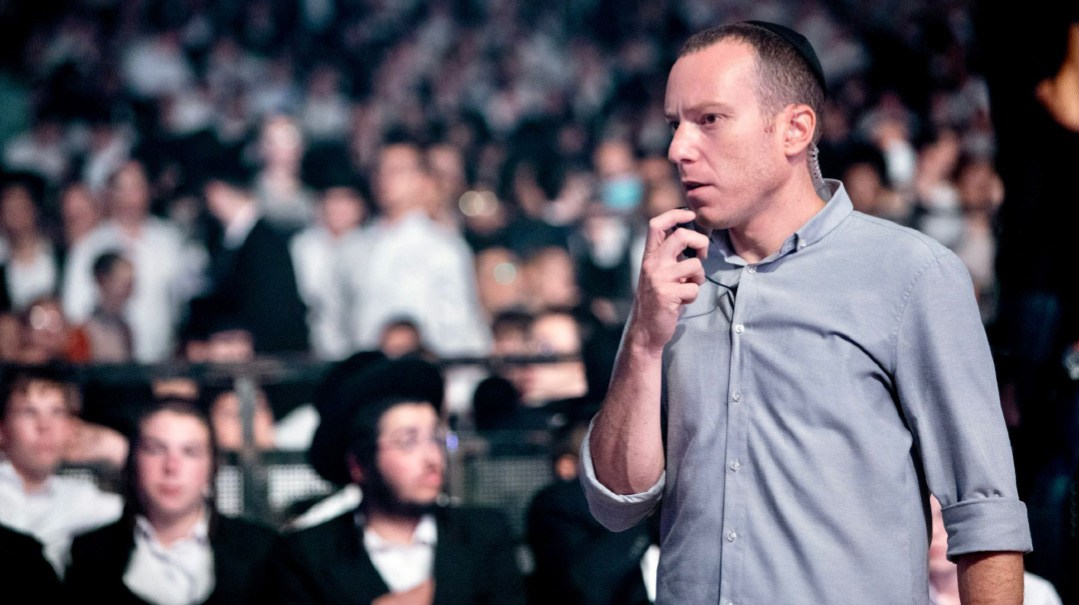
Avigdor is happy when the crowd is happy. “The first people you meet at the gate are the ones who set the tone. If the security guy is nasty, it will ruin the event for you. If he’s a mensch, you’ll get to your seat feeling happy and chilled”
Inside Outside
On the day we meet, Dreskler is working security in Binyanei Ha’umah. Three thousand teenage girls are here for a national meetup for the chareidi Batya organization. Dreksler has his team in place. But with this kind of crowd, is there any chance he’ll have to thwart a terrorist attack?
“Nah, not likely,” he says. “I cover all the chareidi events here. But you should know that crowd control can be as serious as defusing a threat from the outside.”
And what happens at the gate can, in fact, make or break the entire event for a person. “The first people you meet at the gate are the ones who set the tone,” he notes. “If the security guy is nasty, it will ruin the event for you. If he’s a mensch, you’ll get to your seat feeling happy and chilled.
“This is one reason our company is so important. We work in the chareidi sector and most of my unarmed workers are frum guys. You come to the gate, and the security guard is one of you, not someone from the outside trying to control you. He smiles at you, wishes you hatzlachah. That in itself minimizes potential pushiness or aggressiveness. You’re much more likely to file in cooperatively, and by the time you get to your seat, the event has already been a success.”
All 226 personnel undergo training in the nuances of chareidi society in general and within different kehillos in particular. And if at a chareidi event someone doesn’t quite fit inside the box, he’ll be watched and maybe questioned — it could be someone wearing a beketshe on a weekday, or a fellow wearing a Chabad kapote with a chassidishe hat.
Crowd control on the outside doesn’t only engender good feelings. Order on the outside can prevent tragedy from happening on the inside.
“We Jews in Eretz Yisrael have a big problem, specifically because we feel connected to our tzaddikim and our expression of that very beautiful connection with hilulas and yahrtzeits is getting more and more complicated,” Dreksler explains. “Rachel Imeinu, Rabi Shimon — the places haven’t changed in thousands of years, but the people have multiplied. You see the deep desire to connect, but you also know that it’s going to be really, really crowded.
“The chareidi world is in a pickle. Because these places were built for maybe a hundred people, and 250,000 want to be there. So what is there to do? I have no solution. There is one kever, one date, and hundreds of thousands of people who want to daven, to connect in a deep way. How can you take that away from them? The police also understand that if 60,000 people want to come and only 59,000 can get in, then we failed. And although they get a bad rap, they really do their best to make it happen. I sit on these committees so I can attest to this.”
Avigdor might not have a solution, but he did do a communal courtesy by creating a widely viewed public service clip on how to stay safe in large crowds.
“Dochak [crowding, pushing] equals chenek [suffocation], and chenek equals death,” he says.
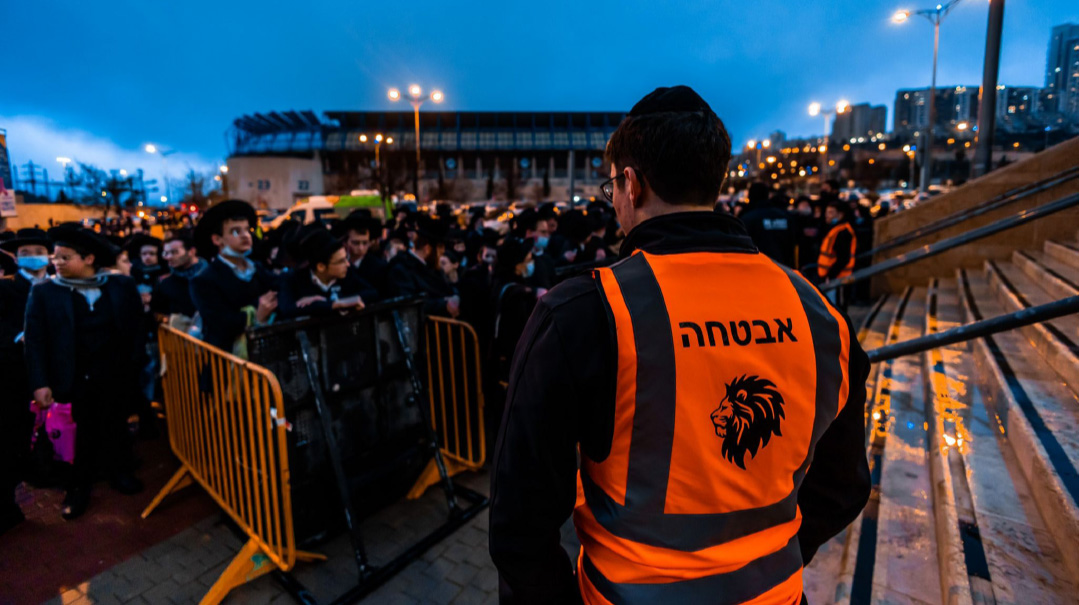
Pick of the Gym
One large, well-built fellow who occasionally helps out Avigdor with crowd control started his own security network specifically for frum weddings and events. He’s not looking for publicity and prefers only to be mentioned by his initials, YRS.
“If people need men, they know where to find me,” he says.
Often, the place to find him is the gym.
“I used to hang out in the gym all the time when I was younger, and that’s where they sleuthed me out,” says YRS, who’s now 25 and has been working as a bodyguard for the past six years. YRS, who made aliyah with his family as a teenager and is a self-described yeshivah drop-out (“I got stuck after yeshivah ketanah and never made it to yeshivah gedolah”), was often hired for temp jobs, eventually figured out the business, and decided to take it a step further.
YRS has his own niche company that deals in frum weddings, events, and crowd management connected to rebbes and gedolim. “We’re proud of the fact that we understand frum people and we know who the VIPs in the community are,” he says.
While private bodyguards try their best to blend in anonymously, in YRS’s field, big, strong, and intimidating is the call of the hour. He has no salaried workers, but instead uses a network of guys — some of whom have half-day jobs, some who are in yeshivah, and some whom he knows from the gym. Sometimes an event will need four guys, sometime 40.
The gym is his favorite place to recruit. “Anyone I see working out who’s big and intimidating, I just walk up to him and ask if he’s interested in doing private security jobs and I take this number. Then, when a job comes up, I can pull a staff together pretty quickly — at this point, I have a full network, where there’s no shortage of big, tough guys who want to make some money on the side. Most of my team is regular guys who happen to look a little threatening, so they throw on a baseball cap and black T-shirt, and they’re good to go.
“We work out regularly, we’re well-built, we’re trained in martial arts. But it’s not always a defining factor. One of our guys has a trim, nimble build and he can sprint over and break up a scuffle across a stadium in seconds, for sure quicker than people twice his height.”
YRS is not licensed to carry a weapon, but at 6’2’’ and with a mass of solid muscle, he hasn’t lost any business. “Most of our clients just want guards there for intimidation. As long as they’re big, tough-looking, and not the kind of guy you’d want to meet in a dark alley, they job’s already half-done,” he says.
He’s done security for the Bobover Rebbe and the Satmar Rebbe from America. At these events, he says, “they don’t want or need armed guards. They just want to prevent a balagan, they don’t want the chassidim to storm their private events. If there are no guards around, even if there’s a no-entrance sign, everyone just ignores it and goes in and it becomes a big mess. Sometimes these events have kids as ushers, but no one listens to them, so they want people who look a little more intimidating, to convince people that it wouldn’t be smart to break the rules.”
He’s typically hired for events such as a hachnassas sefer Torah or a big chassidic wedding, where thousands of people are expected to show. “At weddings, I make sure to position myself on duty close to the chuppah, so at least I get the perk of that special experience. And I try and get personal brachos when possible. That’s the real profit of these events.”
But it’s not all hanging with rebbes and their entourages. YRS says he and a few guys were recently called to a warehouse where the business owner went bankrupt.
“The week before, he was apparently still taking stock from suppliers — and we’re talking very high-ticket items — so there were many furious people circling the warehouse, hoping to gain entry and take back what was theirs, or at least loot it for some value. We were called in to protect the goods until a court order could be issued and the inventory divided legally.
“It was really hard, because I understood the suppliers’ loss and heartache, but I was there to maintain order. One man who tried to physically break past us warned me that I should be sure to get myself a bullet-proof vest, because his guys would be coming to get me.”
Today YRS is selective about the jobs he takes — he’s not looking for danger or crazy adventures — but back when he started out, he and his friends fell into a job securing a Russian mafia wedding. The opulent wedding was in Rishon L’Tzion, and they had no idea about the underground — they were simply told that there was some family tension among the guests and the host wanted to make sure no fight unfolded at the wedding.
“Halfway through,” YRS remembers, “the host who booked us asked my friend to sit in one of the flashy cars out in the parking lot. Just to sit. Okay, no big deal, we were getting paid and didn’t need to ask questions.
“Later, the host called me to take one of the very drunken guests and his wife home with that same car. The guest was too inebriated to get behind the wheel. We got in the car and I put the key in the ignition, when suddenly, in his stupor, my backseat passenger hollered at the top of his lungs ‘Stop, don’t turn the key!’
“He got out, crawled onto the parking lot floor in his tuxedo and literally climbed under the car, searching the undercarriage for a long few minutes — obviously for explosives — and getting filthy in the process. When all seemed in order, he got up, brushed off his suit, and said we were clear to go. To think that I could’ve been blown up had my friend not guarded the vehicle for the night gives me chills to this day.”
Yet even when events are low-key and on heimish turf, there can be a kink in the system. YRS once secured a sheva brachos at a closed location for an influential chassidishe rebbe. About 40 exclusive guests were invited, philanthropists of the chassidic court.
“There were eight of us doing security,” YRS relates. “Our main job was to keep the event exclusive. They gave us the list of invitees so we’d know who to let in. One man showed up, claiming to be a guest, but his name wasn’t on the list — and it made sense, because his garb was nothing like that of the chassidim. He was a real gentleman and very humble and polite about it, quietly making phone calls to try and get access. Suddenly one of the organizers called us frantically to let him in immediately. He was one of their biggest donors! We felt really bad, but we were just following instructions.
“But that wasn’t the end of the story. Within a short time, word got out about the location — a private penthouse in a residential apartment building. With eight of us guarding one set of double doors, you’d think we’d be fine. But suddenly, a thousand-strong crowd of chassidim arrived within a short time. They were determined to get access, and started counting down together… 5, 4, 3, 2, 1… plowing past us and swarming in. We left. It wasn’t possible to stand guard against such a big crowd.”
As a member of the ad hoc chareidi bodyguard club, YRS was also part of the security detail for Rav Chaim Kanievsky in his later years. People would clamor to get an audience with the elderly gadol as he walked into an event, but he was so frail that the team would form a barrier in front and behind to prevent that. YRS worked with Rav Chaim for five years, and although he wasn’t exactly a yeshivah bochur, they somehow bonded among the throngs. And then it was time to say goodbye.
“While the police were in charge of the funeral, we were part of the security detail to keep the courtyard clear until the mitah would be removed from the house,” he remembers. “I peeked inside and saw the bedroom door open — there was someone there boarding up all the closets and drawers so that no one would help themselves to mementos. I slid open the adjoining sliding door to the study and there was Rav Chaim, wrapped in his tallis, on the floor where his desk used to be. I had promised my friend who is in jail, Shlomo ben Shifra, that if I got close to Rav Chaim I would ask him to pull a few strings. So I stood there by the doorway, softly begging Rav Chaim to intervene for my friend once he reached his new place on High. I guess that was the best way to say goodbye.”
The Eyes Have It
Whether your job is to secure a rebbe’s simchah, a convention center, or one wealthy individual, it’s all about being on high alert all the time. Avigdor Dreksler can verify that. His gun is with him at all times, on the job or off the job. Although in fact, he says, he’s always on the job. He’s connected to security platforms and gets information all day long about threats and thwarted attacks — things the public has no idea about.
Good thing he’s a naturally calm, collected guy. “Because I’m always on high alert, even when the rest of you feel safe. My wife might tell me she wants to take the kids out, and I’ll tell her ‘no, not now,’ because I was privy to some information and I know the authorities are dealing with some sort of security risk.”
When it comes to his personal life, that hyper-attunement to danger makes things a little complicated.
“My wife and I will step into a restaurant, and immediately my eyes are scanning the room for something suspicious. When we go to a wedding, my wife is looking at the kallah, and I’m looking at the door.”
Does his family feel the internal tension that comes from a person knowing he’s responsible for the safety of others in a region fraught with danger? “I hope not. I do present with a very unruffled appearance — most people have no idea what’s going on beneath the surface. But what can I do if my eyes and my senses are always on alert? My mother says that when I was a little boy, I would make all sorts of comments about other people and things I saw, some of them embarrassing if overheard.”
Avigdor shrugs. “Nu, she’s probably grateful today. Not just because I turned my inborn capacities into a source of parnassah — but because those talents help keep an unsuspecting public safe and secure.”
C.S. Teitelbaum contributed to this report.
(Originally featured in Mishpacha, Issue 956)
Oops! We could not locate your form.







